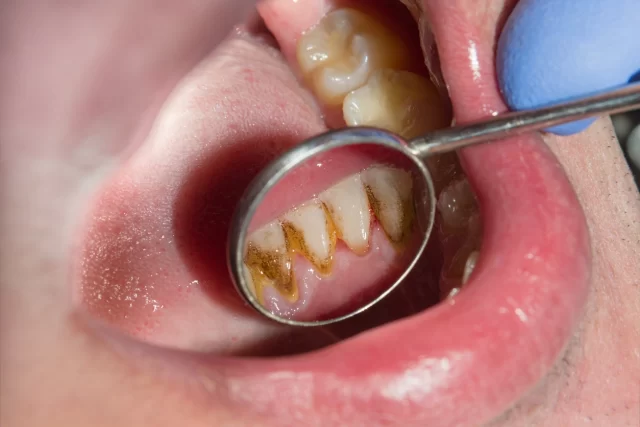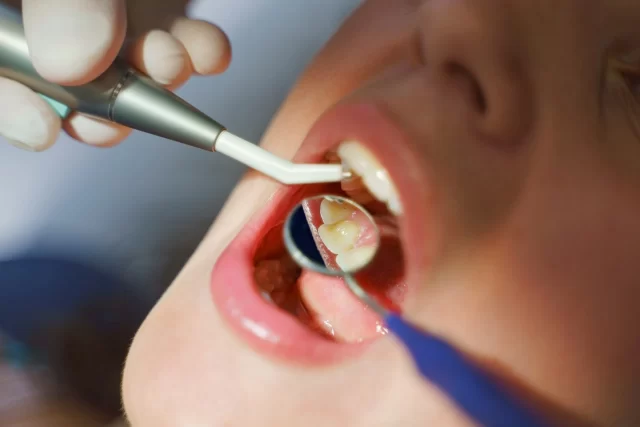Brushing your teeth twice a day is a general rule of thumb. It removes food around your teeth, preventing plaque and cavities. But did you know that brushing cannot remove everything? That is where scaling and polishing comes in.
Scaling and polishing are two important dental procedures. They help remove hardened dental plaque or tartar, keeping your mouth fresh all year round. Here is a closer look at what is scaling and polishing:
What is Dental Plaque and Tartar
(Image Source: istockphoto.com)
Before we get into the nitty gritty, it is important to understand what plaque is. Plaque accumulates on the surface of your teeth and gum line. It is a sticky, colourless film of bacteria that develops over time.
This is mainly due to the combination of bacteria and starches from the food you eat. When not removed properly, plaque can harden into tartar. Unlike plaque, tartar cannot be removed with regular brushing or flossing.
This can contribute to the development of cavities and other gum diseases. The only way to remove tartar is through professional teeth cleaning services like scaling and polishing.
What is Scaling and Polishing
(Image Source: elements.envato.com)
Scaling and polishing involves the removal of plaque and tartar. During scaling, the dentist uses specialised instruments such as scalars or ultrasonic devices to carefully remove the tartar. The process involves scraping and scaling the surface of your teeth.
Polishing comes after scaling and it aims to smoothen the teeth. This step is crucial for removing remaining stains and achieving a clean, polished finish. The dentist will use a polishing paste and a rotating rubber cup to gently polish your teeth.
This not only enhances the appearance of your teeth but also prevents future buildup.
The Benefits of Scaling and Polishing
Dental cleaning comes with its fair share of benefits. They extend far beyond a sparkling smile and include:
Prevents Gum Disease
Getting your teeth scaled and polished will prevent gum disease. Tartar buildup can lead to inflammation and infection of the gums, known as gingivitis. If left untreated, gingivitis can progress to more severe forms of gum disease.
This includes periodontitis, which can cause gum recession and tooth loss. Scaling and polishing will reduce the risk of gum disease while preserving gum health.
Reduces Risk of Cavities
Tartar buildup provides a breeding ground for harmful bacteria that can cause tooth decay and cavities. By removing tartar through scaling and polishing, you can reduce the risk of cavities and maintain strong, healthy teeth.
Freshens Breath
Tartar buildup can harbour bacteria that produce foul-smelling compounds. This can lead to bad breath and in worst case scenarios, halitosis.
Scaling and polishing can eliminate the source of bad breath, helping you achieve better oral health.
Enhances Aesthetics
Looking good and feeling good go hand in hand. By prioritising dental cleaning, you will also enhance your smile. The scaling and polishing process will remove surface stains and leave your smile looking brighter.
Prevents Systemic Health Issues
Poor oral health has been linked to an increased risk of chronic health problems like heart disease, diabetes, and respiratory infections. Maintaining good oral hygiene can reduce the risk of these serious health conditions.
Saves Money in the Long Run
Prevention is always better than cure when it comes to dental care. Investing in regular scaling and polishing can help prevent costly and extensive dental treatments down the road.
This can save you both time and money in the long run.
How Often Should You Polish and Scale Your Teeth
Most dentists recommend getting your teeth scaled and polished every six months. This is the golden rule when it comes to preventing and managing plaque. However, plaque formation differs from person to person.
Some people develop plaque much faster than others so it is important to get a dentist recommendation. If your teeth are prone to buildup, you may require more frequent teeth cleaning. This can be every three to four months.
On the other hand, people with excellent oral hygiene can scale their teeth every nine to twelve months. It is essential to work closely with your dentist to determine the best schedule for a checkup.
Conclusion
The importance of dental scaling and polishing must not be overlooked. Personal hygiene is vital for your health with oral care playing a big part. So remember to consult your dentist and plan that check up because dental plaque waits for no one!
Get in touch to schedule an appointment!









